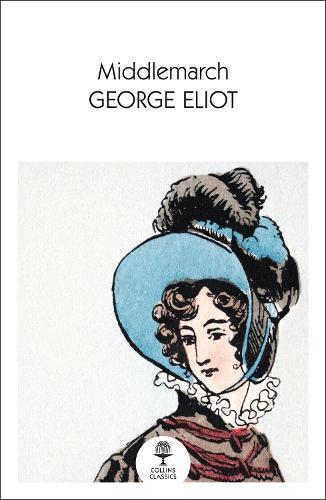Middlemarch is one of those books that is highly regarded as one of the best of its era, but having read it, it’s certainly one that might not appeal so much to the modern reader. I definitely enjoyed reading it, but it’s quite a slow read, and one that has a number of different story threads that you need to keep on top of. It’s definitely not one to read if you’re not used to the classic novels of that era.
The story is all about a small town called Middlemarch (hence the title) and it tells you about the lives of several different people who live there. At first it tells the story of two sisters named Dorothea and Celia Brooke who live with their uncle and who encounter several men/potential husbands. Then after a little while, it shifts perspectives and you learn about a man named Fred (who’s considered to be something of a failure) who’s trying to woo a lady named Martha, and then also a man called Tertius Lydgate who comes to Middlemarch to open up a doctor’s surgery.
A lot of the time, it might feel a little aimless. The characters go about their lives and have their own little dramas and developments, but it doesn’t feel like a cohesive novel that’s moving towards anything in particular. With a lot of novels, you know what it’s all leading up to, but with Middlemarch, there’s no clear endpoint. This isn’t a criticism by any means, just a description of what makes it unusual, though I appreciate that this will be off-putting for some readers.
As for me, I appreciated the slow-burn way in which I got to know all of the characters. Lydgate and Dorothea in particular were two who left a very positive impression on me. Both of them have relationship troubles and, in many way, their experiences mirror each other. There’s a clear journey of character development for them both, with Dorothea becoming less naïve in a positive way, and learning to better understand people and the world, and Lydgate become less naïve in a negative way, and hitting some very hard times after things don’t work out as he hoped. I love Dorothea’s growing sense of independence and maturity, and I loved Lydgate’s short, but well-meaning manner of speaking to people. It was a pleasure to get to know them both.
I have to say though, that this is a fairly long book, and there were certainly times when I just found myself hoping for a chapter to end, because it focused on things that just felt very mundane. That’s not to say that there weren’t some great character moments, and even shocking revelations, but other times chapters seemed to focus on people who were just living their regular lives, and it could be a bit grating, especially when it has quite a large cast. I wasn’t equally invested in all of them, so it was a shame when one of the more uninteresting or unlikeable characters took the spotlight for a while.
Still, George Eliot has done a fantastic job of creating a community of characters with unique motivations, histories, and personalities. The way in which their lives intersect was often as satisfying as reading a crossover. It isn’t one of my favourite classics, but I am still glad that I read it.
Rating: 7.3/10

